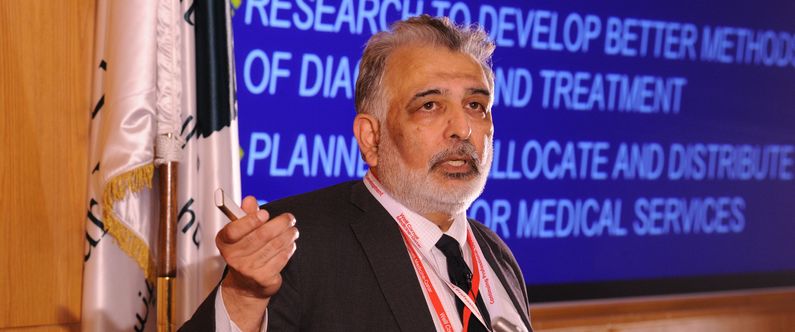Fungal infections and psychiatric disorders discussed at WCM-Q Grand Rounds
 Dr. Rajiv Tandon of Western Michigan University Homer Stryker M.D. School of Medicine speaking at WCM-Q Grand Rounds.
Dr. Rajiv Tandon of Western Michigan University Homer Stryker M.D. School of Medicine speaking at WCM-Q Grand Rounds.
Two leading experts in their respective fields of medicine spoke at the latest instalments of Weill Cornell Medicine-Qatar’s (WCM-Q) Grand Rounds.
Molecular scientist Dr. Kin-Ming Tsui of the Department of Pathology at Sidra Medicine gave a lecture titled On the Emergence of Candida Pathogens, while Dr. Rajiv Tandon, Professor and Chair of the Department of Psychiatry at Western Michigan University Homer Stryker M.D. School of Medicine gave a lecture titled Classification of Psychiatric Disorders – Circa 2020.
Dr. Tsui, who is also assistant professor of pathology and laboratory medicine at WCM-Q, outlined the significance of the fungus Candida auris as a human pathogen, described its global emergence and explained the public health concerns associated with pathogenic fungi. He said: “Out of the approximately 1.5 million different species only about five percent of them are well categorized, so only about 80,000 fungi actually have names and only about 300 species are known to cause human infections. If they infect the skin they can usually be treated fairly easily, but if they cause an invasive infection in the blood or organs, which we call fungal sepsis, they are very hard to treat. Candida is the most common cause of fungal sepsis.”
Dr. Tsui explained that Candida auris is an emerging global health threat because some strains are highly resistant to multiple antifungal drugs. He also said that while the global rates of invasive fungal infections are low compared to other infectious diseases like malaria, tuberculosis and HIV/AIDS, they are of concern because mortality rates are extremely high, averaging around 70 percent. Additionally, the incidence of Candida auris infections has grown rapidly in almost all parts of the world since 2009, a phenomenon that scientists are still unable to explain. As such, more research must be done to determine the causes of this increased prevalence and to develop new antifungal therapies, he said.
Dr. Tandon, who was visiting WCM-Q from the US as part of the college’s Visiting Professorship Program, described the two principle international systems for classifying psychiatric disorders, the Diagnostic and Statistical Manual of Mental Disorders (DSM) produced by the American Psychiatric Association (APA) and the International Classification of Diseases (ICD) produced by the World Health Organization. He also explained how DSM-5 can be used to more effectively describe the nature of psychiatric disturbances and provide measurement-based clinical care to patients.
Both lectures were accredited locally by the Qatar Council for Healthcare Practitioners-Accreditation Department (QCHP-AD) and internationally by the Accreditation Council for Continuing Medical Education (ACCME).